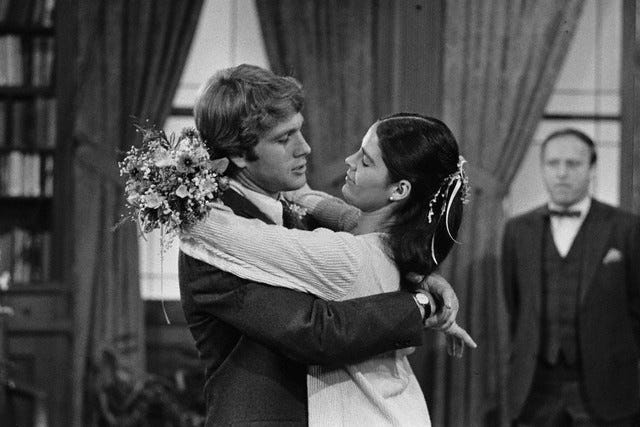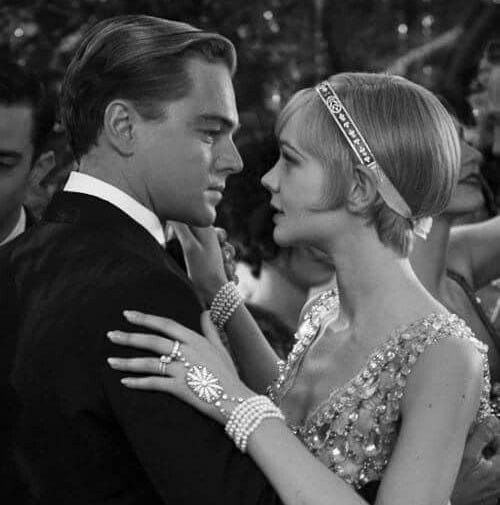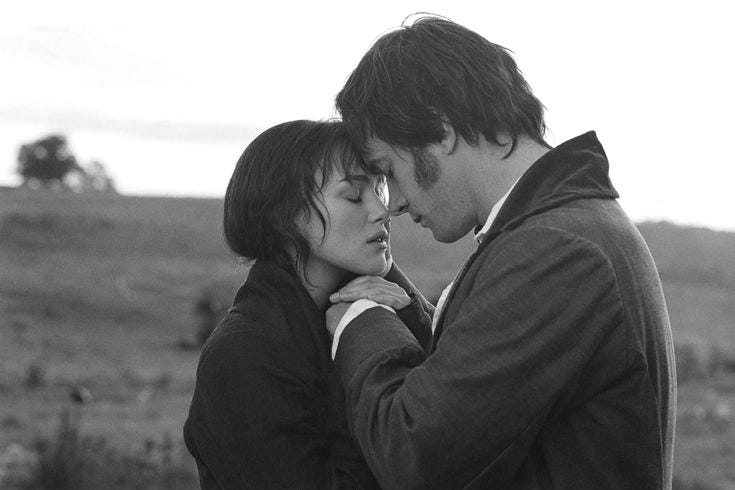Letters from a Zoomer girl: You don't fall in love with someone for what they are, you fall in love with them for who they are.
Love is the most potent human emotion - powerful enough to ignite the Trojan War, inspire Shakespeare’s timeless sonnets, and shape the great works of Jane Austin and Emily Brontë. As humans, we spend our lives trying to understand love and what it means to love another; yet we often fail to grasp its full essence. Love in isolation may seem easy to comprehend, but when intertwined with other potent emotions - rage, jealousy, sadness, deceit and the weight of societal expectations - it becomes far more complex.
As we distance ourselves from our visceral human nature, the waters of understanding have become increasingly muddied. Today, when it comes to finding love, we are focusing on the superficial ‘what’ rather than the authentic ‘who’. Instead of loving someone for the depth of their soul & who they are, we’re taught to focus on what they are - their job title, income, appearance, and what they can do for us. Our focus on superficial traits is overshadowing the deeper connection that makes love and relationships more meaningful. It's time we shift our focus.
“What” & “Who”?
The grammar purists might come at me for my use of “what” & “who” in this essay, therefore I must set out how I use these specific terms to avoid confusion. What you are encompass everything observable at a surface level. The job you have, eye colour, height, the car you drive, your status in society's hierarchy, the clothes you wear - essentially, any outward marker of success. If someone wanted a relationship with you based purely on your “whats”, you’d likely feel undervalued, probably objectified and disposable. “Who” you are - your thoughts, emotions and individuality - would pale in comparison to the external markers of success and appearance. Your “whats” are fleeting—things that life’s unpredictability can take away in an instant. What remains, then, is your “who.”
Who we are is intrinsically tied to the essence of our being - our “who” is what transforms us from a mere vessel into a living, breathing soul. Our search for love, at its core, is a longing to bare our souls - to be truly seen and understood for who we are. Who we are, deep down inside, reflects in every move we make - how we treat others, the decisions we make, the moral dilemmas we face and how we act in moments of adversity. Who we are is deeply personal, and exposing that side of ourselves requires vulnerability - especially in a cold, harsh world that doesn't always know how to appreciate a beautiful soul. In these little moments when we bare our soul - the song that never fails to make you cry, the shyness when a lover gazes into your eyes, the sadness that still lingers, and the courage it took to get over a fear. These should be the reasons why someone loves you - it makes you who you are.
Our world is so lacking in romance because we have succumbed to societal pressure, which tells us our external achievements define our worth. Appearances have come to matter more than truth or authenticity. We have turned people into a commodity, something to be consumed and discarded once a person no longer serves their purpose. Someone focused on the “what” might date a fireman for his reputation for being a hero or his outward appearance, while someone focused on the “who” would be drawn to a fireman because of his deep commitment, the selflessness that drives him to sacrifice his life to save others.
Despite our longing to be seen and loved for who we are, many of us are caught up in the allure of external qualities, leading to unstable relationships built on superficial foundations.
The Allure of “What”
It's natural for people to seek security and stability in troubling times. In a world where our culture, our values and societal expectations shift rapidly, even love has been co-opted. No longer is our quest for love decided by fate but by dating app algorithms. Romance is dead, and our worship of convenience is to blame.
Our initial attraction to someone is often only surface level because we haven't seen their heart yet. Even in simpler times, before technology took over, love often began in a fleeting moment - a glance exchanged while admiring a masterpiece in the Louvre or a familiar face in the local store that slowly became something more. However, something about that fleeting moment doesn’t feel surface-level to me—they don’t say the eyes are the window to the soul for nothing. I almost believe our bodies recognise love before our minds can catch up, like magic running through our veins, and it’s all we need to sustain us. Although I can't say I've ever been in love, I have felt very strongly for someone, which left me constantly trying to make sense of my feelings, as they seemed somewhat irrational. I’d consider myself a rational person, yet these emotions felt almost unexplainable. I eventually realised there was no way for me to explain how I felt—this was a matter of the heart.
The way people speak about dating today gives the suggests they want to possess someone—not to love them, but to display them, to flaunt them for their Instagram followers. We’ve all seen the trends on TikTok—women talking about their desire for the guy in finance, with a trust fund, 6 '5 and blue eyes. Part of our desire for these attributes is inherent—both men and women have biological instincts that shape attraction. Women tend to seek a partner with resources and strength, someone capable of providing security for them and their children. Men, on the other hand, are predisposed to be drawn to traits that signal fertility, such as an attractive face and childbearing hips.
All of that is fair and natural, however modern society is exploiting our urges - turning our desires into a commodity. Instead of dreaming about the man that will cherish & love you, we are consumed with narcissistic thoughts like “is this man aesthetically pleasing enough to soft launch on insta?” or or fixating on expensive dates—forgetting that the true purpose of a date is simply to enjoy each other’s company. There’s no regard for the romance of it all—the longing to truly know someone, to uncover the intricacies of their nature, to understand them so deeply that you know exactly how to shield them from the harsh realities of the world.
Consumerism has seeped deep into every facet of our lives. The disposable nature of things - fashion, electronics - has intruded on relationships making it the norm to discard connections when they don’t satisfy external expectations. Two people may be deeply compatible, sharing the same hopes and desires, yet without the right prestigious education, job title, or family name, one of them may be deemed unworthy and cast aside. In my opinion, it's cowardly to discard people to appease one's need to feel accepted by society's shallow expectations.
A relationship built solely on the "what" is like a house without warmth—structurally intact but cold and unwelcoming, leaving you exposed when you need comfort the most. A couple who have a relationship based on these external qualities will soon begin to stray when their idealised image of the person begins to fade. In the Great Gatsby, Jay is captured by Daisy's charm and societal position - so much that be builds his entire life around trying to win Daisy back. Despite becoming incredibly elusive, wealthy and throwing grand parties, Gatsby is never accepted by the elite that Daisy belongs to. Daisy is drawn to Gatsby for his newfound wealth and the image of himself he sells to her. While she enjoys attention from Gatsby, she chooses the stability of her marriage to Tom over uncertainty with Gatsby.
Daisy and Gatsby’s relationship eventually falters because it is built on nostalgia & illusion rather than reality. Gatsby is unable to let go of the past, clinging to an idealised version of Daisy instead of accepting her for who she is - her authentic self. Meanwhile, Daisy prioritises the status and stability that her marriage to Tom provides, over her feelings for Gatsby. Their relationship is built on secrecy and fantasy instead of honest communication. Taking the time to talk about their feelings and expectations, could have built their relationship on truth rather than superficial falsehoods. If Gatsby had pursed his ambitions for himself rather than as a means to win Daisy back, and if Daisy had the courage to defy societal expectations, they could have had a real chance.
The Authenticity of “Who”
Since I began to understand love and relationships, I have done nothing but daydream about being in love. I remember, as a teenager, walking home from the library, lost in thoughts of a man who loved and cherished me—so deep in my own world that I sometimes accidentally fell into a bush or walked into a lamp post. Love has always entranced me, everything I’ve consumed - books, films, poetry, music - all centre around love, trying to get a feel for what it's like.
Like many others, I once placed too much value on 'what' a person is—until I realised how superficial it was. The times I have truly felt for someone, my focus was never on their status or appearance, but on the essence of who they were. It wouldn't matter whether they were a pauper or a wealthy baron, tall or short, blue-eyed or brown-eyed, well-educated or illiterate—what mattered was that even the smallest glimpse of their soul, when revealed to me, spoke to my own. Love, at its core, is about this recognition, this unspoken understanding that transcends the external.
When you focus on who a person truly is, you catch a glimpse of their soul. By prioritising truth over pretension and disregarding societal expectations, you can seek what truly matters—shared values, emotional intimacy, and mutual respect. You see them as they are, not as an idealised version crafted in your mind.
Through deep and intimate exploration, you discover exactly who will stand by your side through both joy and hardship. Do they falter at the first sign of adversity, or are they steadfastly loyal? Do they seek to understand you? Despite your flaws, is their love unwavering? Do they encourage the best in you? None of these things are determined through focusing on “what” a person is. We all know how life can change in an instant—our external world is fleeting. One moment, we may have it all, but a storm can arrive and alter everything forever. Yet, what always remains is a person’s essence. Despite external changes, our true nature endures.
Love and relationships are complicated because people are complex. Pride and Prejudice is considered one of the greatest love stories, yet its characters are deeply flawed. Elizabeth sees Darcy as arrogant, while Darcy, drawn to her, struggles with pride and societal expectations. Their bond is tangled in lies and misunderstandings, but once the truth is revealed, they fall in love.
Their relationships succeeds because both characters undergo significant personal growth, learning to overcome their own flaws - his pride and her prejudice. In contrast to Gatsby and Daisy, Mr Darcy and Elizabeth’s love is built on mutual respect, honesty, a willingness to change and a deeper understanding of each other.
We see Darcy initially struggle with arrogance and superiority. After being rejected by Elizabeth, he reflects on her criticisms of his character and humbles himself. Instead of continuing his arrogance, he demonstrates kindness and humility which proves disproves Elizabeths original prejudice. Through Elizabeths own recognition of her prejudice and misjudgements she is able to see Darcy for who he truly is.
Their love is strengthened by open communication and emotional maturity - they accept each other not as idealised figures but as flawed, yet deeply compatible, individuals. This mutual transformation and willingness to change is what makes their love succeed, rather than fade like Gatsby and Daisy’s.
While the allure of “what” is enticing, true love does not stem from it. True love is built on something deeper - the essence of “who” a person is.
Love & Vulnerability
Being in love is perhaps the peak of the human experience, yet it can also bring deep heartache. In the early stages of a relationship, both people wait with bated breath, wondering when—or if—things will fall apart. Our feelings are on the line; we’ve exposed everything—our flaws, pain, and past traumas—asking someone to love us. But what happens if they don’t? C. S Lewis once said “To love at all is to be vulnerable. Love anything and your heart will be wrung and possibly broken” The Four Loves (1960). Part and parcel of love is accepting that your heart will get broken but also having faith that one day you will love and be loved again.
When you choose to love someone for who they truly are, you build a foundation for a relationship rooted in deep understanding and mutual growth. You can heal past wounds, lift each other up, and deepen your love as you grow in emotional intimacy. None of this will be easy—life’s challenges are inevitable—but developing an intimate relationship based on a deep, authentic connection will provide you with steadfast support and unwavering devotion.
Conclusion
While the allure of “what” may be enticing - true love is built on something deeper - the essence of “who” a person is. This doesn’t mean external factors have no place in attraction, but lasting love is forged in understanding, resilience, and authenticity. By having a long list of demands of what a person must be like, we are reducing love to a checklist, overlooking the depth of connection we can find by opening our heart to authenticity and passion. In the end, love isn't about status, beauty or wealth - it's about loving someone for everything that makes them exactly who they are.








in fine print: your vision of who someone is, is totally colored by a biased perception of what they are.
For example, women find attractive men funnier, but don’t find funny men more attractive.
But by choosing to not account for your bias, you get to be unaccountable for your choices.
A win-win! Except for everyone who loses, but they deserve it! For who they are!
The best love stories have all been written by men. Men experience love in a way that can make or break nations. Women must begin to accept that passionate love that men have harnessed - by rejecting it, by negating it's power, you do a disservice to every man who has ever loved and lost, who has had to remake himself and his nation time and time again.
From Anatolia to India, from Ireland to Russia, men have sought to create lavish palaces for their women. From the humble woodman's cot to the great aristocratic estates - it's all been for the women we love.
We loved our women so much that when they asked we destroy everything just so they can feel equal, we did so. We are fools for this love.